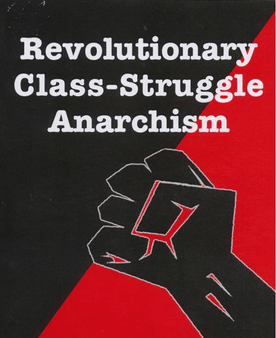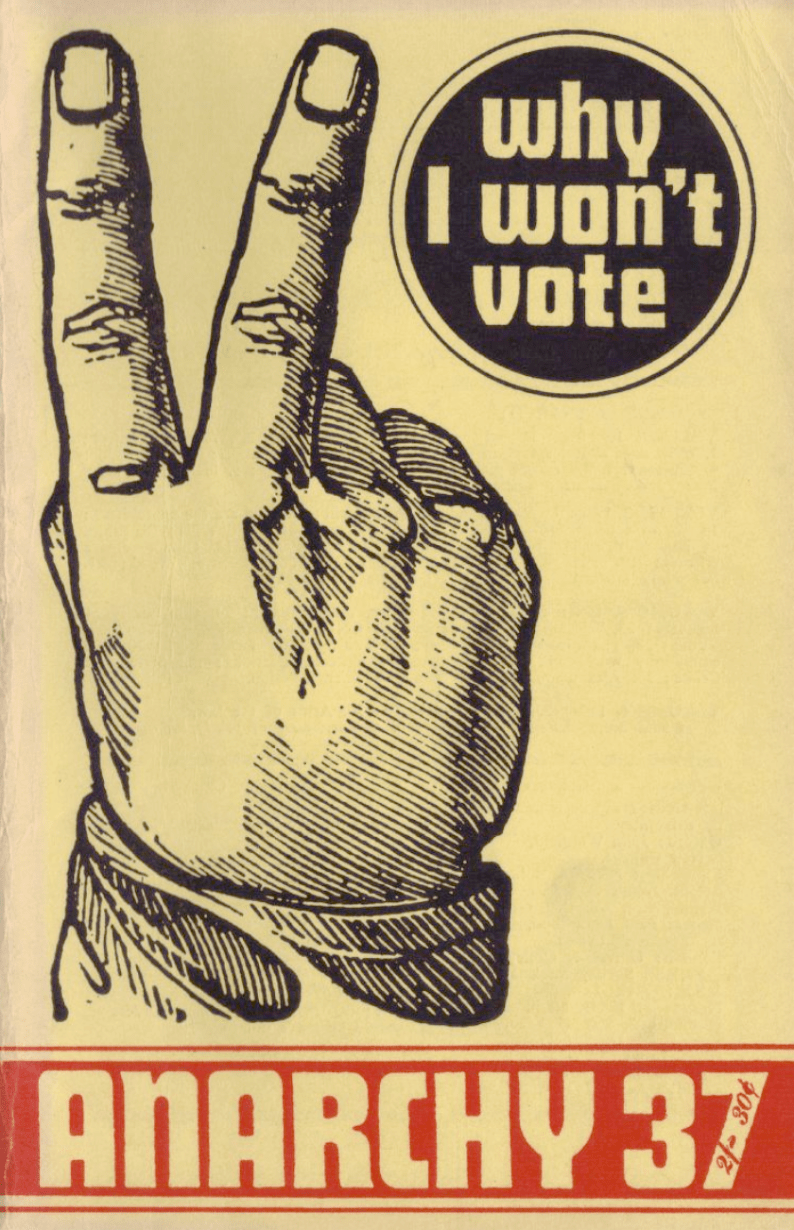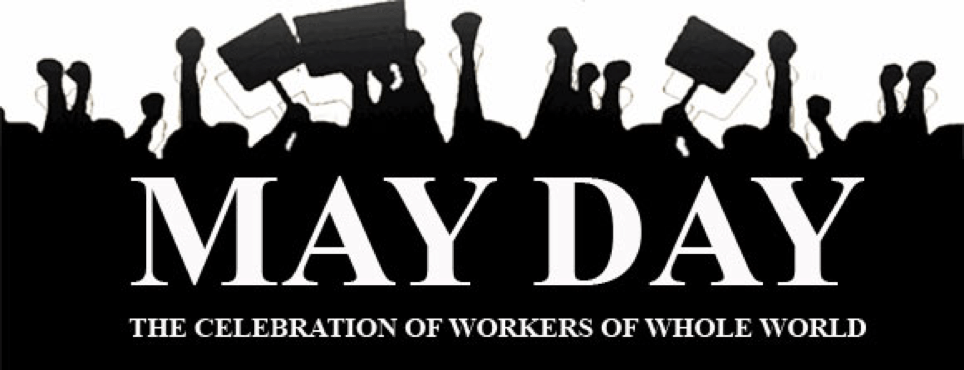By calling ourselves class struggle anarchists we make it clear who we are against and what we are for.
from thefreeonline on December 8th 023 by The Polar Blast ( New Zealand)

The Polar Blast supports class struggle anarchism. Class struggle anarchism firmly continues the traditions of anarcho-communism with its focus on class against class, and its support for the whole working class.
Workers have a special relationship to the means of production (and distribution and social services), which are owned by the minority capitalist class. Workers lacking access to land and capital only have the ability to sell their labour to survive. This is how surplus value is created, as we produce more in value than we receive.
This is the basis for the capitalist’s profits, and it is how we are exploited, not just individually, but as a class. Saying that, it is important to note that we consider the working class to be broader than those immediately employed and includes the unemployed, the retired, the disabled and those who are home-makers and caregivers.

We oppose all exploitation, the alienated work that goes with it, and the poverty created by it. Our aim is a classless society, and we maintain that it is only those who are exploited who have an interest in ending their own exploitation, and the capability to do so.
Having their hands on the means of production, transportation, distribution, communication, and service, the working class has a potentially enormous power, which could transform all society.
So, as class struggle anarchists, we see the working class as being central to the fight against capitalism. Yet we are not class reductionists, as so many people accuse us of being. We see the relationships between class and other sections of society and their systems of oppression. We say that all oppression is wrong and should be resisted.
Furthermore, we do not believe that non-class oppressions will be resolved once a classless society is reached. Nor do we just see issues like racism and sexism as problems only because they divide the working class, rather than separate issues in themselves. Instead, we see all oppressions as being intertwined and not consisting of distinct groups of workers – over there, Māori; over there, women, in yet another place, the disabled.
Society can be examined in terms of class (workers and capitalist), race/ethnicity (Māori/Pakeha (non Maoris)), etc. but these groups consist of the same overlapping groups of humans, they can be looked at in terms of their identity, but they can also be looked at in totality and with their relationship to the means of production.
For example, Māori are overwhelmingly in the working class, most being in the poorest sections. Their oppression serves two class purposes- it creates a pool of workers who can be exploited at low wages, and it weakens the overall working class, due to racial divisions and the white workers’ belief in their superiority linked to capitalism and the era of imperialism to build support for colonialism.
Another example is patriarchy. Patriarchy coerces women into a specific caregiving/reproducing role within the nuclear family, which under capitalism is a centre of consumption. It is where the labour power is re-created through coerced reproductive labour. It is where the culture of our society is passed on to the next generation. Again, this directly affects, and is affected by, the class structure and all other aspects of our politics and culture.

Other areas of oppression such as homophobia & transphobia, for example, are used to police social definitions of gender rooted in the capitalist family structure and its social psychology. This means queerphobia and patriarchy have a mutually reinforcing relationship and they both strengthen capitalism.
The point being made is that each oppression all supports capitalist exploitation and are supported by it. The fight against one is a fight against all. The ending of one requires the ending of all. There can be no classless society without the liberation of Māori, women, etc.
In a study of anarchism, Benjamin Franks stated that “capital relations [are] dominant in most contexts, but not the sole organizing force….Capitalism interacts with other forms of oppressive practices that may not be wholly reducible to economic activity…. However, as capitalism is still a significant factor, economic liberation must also be a necessary feature.” (Rebel Alliances, 2006, Edinburgh: AK Press; p. 181). So the goal has to be the total overthrow of the ruling capitalist class, its destruction as a class, and replacing it with a stateless, classless society.
As a whole, men do dominate women, but that does not mean all men run society. Pākeha dominates Māori, but not all Pākeha meet to decide on policies that affect Māori. In both examples, those who may be labelled the oppressor in fact have little power.
However, the capitalist class does run society. They control the goods and services we receive, they determine wage rates, they determine unemployment and employment, and they pretty much control the political parties. They own the mass media which shapes our popular culture. If there is to be a better world, then their class rule has to be overthrown.

So how is this class to be overthrown? Throughout history, the struggles of minority groups have shaken up the world. The BLM Movement has had a powerful reach into many cultural and sporting areas.
The women’s liberation movement towards the end of the last century had many consequences that shaped society. The LGBTQIA+ movement has also massively affected our cultural thinking. A Māori renaissance has seen Treaty Settlements, and the wider adoption of Te reo Māori. Yet, on a socio-economic basis a few individuals may have improved their positions but as a whole there are still gender pay gaps, and minorities over-represented in the lower ends of the socio-economic scales.
Only a united working class has the ability to stop society altogether and rebuild it in a new way. Our class controls the manufacture and distribution of goods that capitalism survives upon. The reality of capitalist politics and their control of the media is to stop the awareness of this and prevent a revolution from happening.
But saying this, as revolutionaries we support every struggle against oppression, whether connected to class or not. Each system of oppression supports capitalism and is supported by it. Fighting against capitalism undermines oppression, and fighting against oppression undermines capitalism.
But we must point out how every oppression is related to capitalism and point out the need for revolutionary change. We should point out the connections to strengthen the links between struggles, else we become divided and weakened. In every movement, we need to point out the class conflicts that arise to try and prevent them being taken over by pro-capitalist reformist leaderships.
It is only by acting as a multinational, multi-cultured, multi-gendered working class that we can bring together all the anger flowing from different sources and channel it into a revolutionary movement of all the people, for all the people.
If you find yourselves in agreement with The Polar Blast there is a place for discussion here: https://www.reddit.com/r/aotearoan_anarchism/
Topics: anarcha-feminism, anti-racism, aotearoa, class struggle anarchism, decolonization, feminism, indigenous sovereignty, introductory, New Zealand, oceania
Related
We asked ChatGPT to write us a song about anarchism and this is what we got

Zoe Baker, Means & Ends: The Revolutionary Practice of Anarchism in Europe and the United States (2023). Review and ReadJuly 23, 2023In «Anarchism»
Lessons from the History of Chinese AnarchismApril 5, 2023In «Anarchism»
New green syndicalist webzineJune 11, 2023In «Anarchism»
Anarchism According to the Haymarket Anarchists – Jessica MoranJuly 14, 2023
Black Flag Anarchist Review Volume 3 Number 1 (Spring 2023)April 2, 2023
Why I Won’t Vote ~ A SYMPOSIUM #8August 26, 2023
leer en castellano
Anarquismo y lucha de clases (2023) – Anónimo
El Polar Blast apoya el anarquismo de lucha de clases. Al llamarnos anarquistas de la lucha de clases dejamos claro contra quién estamos y a favor de qué estamos. El anarquismo de lucha de clases continúa firmemente las tradiciones del anarco-comunismo con su enfoque de clase contra clase, y su apoyo a toda la clase trabajadora.

Los trabajadores tienen una relación especial con los medios de producción (y de distribución y servicios sociales), que son propiedad de la minoritaria clase capitalista. Los trabajadores que carecen de acceso a la tierra y al capital sólo tienen la posibilidad de vender su trabajo para sobrevivir. Así es como se crea la plusvalía, ya que producimos más valor del que recibimos. Esta es la base de los beneficios del capitalista, y así es como somos explotados, no sólo individualmente, sino como clase.
Dicho esto, es importante señalar que consideramos que la clase trabajadora es más amplia que los empleados inmediatos e incluye a los desempleados, los jubilados, los discapacitados y las personas que se ocupan del hogar y los cuidados.
Nos oponemos a toda explotación, al trabajo alienado que conlleva y a la pobreza que crea. Nuestro objetivo es una sociedad sin clases, y mantenemos que sólo los explotados tienen interés en acabar con su propia explotación, y la capacidad de hacerlo. Al tener en sus manos los medios de producción, transporte, distribución, comunicación y servicio, la clase obrera tiene un poder potencial enorme, que podría transformar toda la sociedad.
Por lo tanto, como anarquistas de la lucha de clases, vemos a la clase obrera como el centro de la lucha contra el capitalismo. Sin embargo, no somos reduccionistas de clase, como tanta gente nos acusa de ser.Vemos las relaciones entre la clase y otros sectores de la sociedad y sus sistemas de opresión. Decimos que toda opresión es mala y debe ser resistida.

Además, no creemos que las opresiones no derivadas de la clase se resolverán una vez que se alcance una sociedad sin clases. Tampoco vemos cuestiones como el racismo y el sexismo como problemas sólo porque dividen a la clase obrera, en lugar de cuestiones separadas en sí mismas.La sociedad puede examinarse en términos de clase (trabajadores y capitalistas), raza/etnia (maoríes/pakeha), etc., pero estos grupos están formados por los mismos grupos humanos superpuestos, pueden examinarse en términos de su identidad, pero también pueden examinarse en su totalidad y con su relación con los medios de producción.
Por ejemplo, los maoríes pertenecen en su inmensa mayoría a la clase trabajadora, la mayoría de ellos en los sectores más pobres.
Otro ejemplo es el patriarcado, que obliga a las mujeres a desempeñar un papel específico de cuidadoras y reproductoras en el seno de la familia nuclear, que en el capitalismo es un centro de consumo, donde se recrea la fuerza de trabajo a través del trabajo reproductivo forzado. El patriarcado coacciona a las mujeres para que desempeñen un papel específico de cuidado y producción en el seno de la familia nuclear, que bajo el capitalismo es el centro de consumo, y es donde se recrea la fuerza de trabajo a través del trabajo reproductivo coaccionado.
Lo que se quiere decir es que todas las opresiones apoyan la explotación capitalista y son apoyadas por ella.La lucha contra una es una lucha contra todas. El fin de una requiere el fin de todas.No puede haber una sociedad sin clases sin la liberación de los maoríes, las mujeres, etc.
En un estudio sobre el anarquismo, Benjamin Franks afirmó que «las relaciones de capital [son] dominantes en la mayoría de los contextos, pero no son la única fuerza organizadora….. El capitalismo interactúa con otras formas de prácticas opresivas que pueden no ser totalmente reducibles a la actividad económica…..Sin embargo, como el capitalismo sigue siendo un factor significativo, la liberación económica también debe ser una característica necesaria»(Rebel Alliances, 2006, Edimburgo: AK Press; p. 181). Así que el objetivo tiene que ser el derrocamiento total de la clase capitalista dominante, su destrucción como clase y su sustitución por una sociedad sin Estado y sin clases.
En conjunto, los hombres dominan a las mujeres, pero eso no significa que todos los hombres dirijan la sociedad. Los pākeha dominan a los maoríes, pero no todos los pākeha se reúnen para decidir las políticas que afectan a los maoríes. En ambos ejemplos, los que pueden ser etiquetados como opresores tienen, de hecho, poco poder. Sin embargo, la clase capitalista dirige la sociedad. Controlan los bienes y servicios que recibimos, fijan los salarios, determinan el desempleo y el empleo y controlan prácticamente todos los partidos políticos. Son dueños de los medios de comunicación de masas que conforman nuestra cultura popular.
¿Cómo derrocar a esta clase? A lo largo de la historia, las luchas de los grupos minoritarios han sacudido el mundo. El movimiento BLM ha tenido un gran alcance en muchos ámbitos culturales y deportivos. El movimiento de liberación de la mujer a finales del siglo pasado tuvo muchas consecuencias que moldearon la sociedad. El movimiento LGBTQIA+ también ha influido enormemente en nuestra mentalidad cultural, mientras que el renacimiento maorí se ha traducido en la firma de tratados y la adopción generalizada del Te reo Māori. Sin embargo, en el plano socioeconómico, aunque algunas personas hayan mejorado su situación, en general sigue habiendo diferencias salariales entre hombres y mujeres, y las minorías están sobrerrepresentadas en los puestos más bajos de la escala socioeconómica.
Sólo una clase trabajadora unida tiene la capacidad de detener la sociedad y reconstruirla de una nueva manera. Nuestra clase controla la fabricación y distribución de los bienes de los que sobrevive el capitalismo. La realidad de la política capitalista y su control de los medios de comunicación es impedir que se tome conciencia de ello y evitar que se produzca una revolución.
Pero dicho esto, como revolucionarios apoyamos toda lucha contra la opresión, esté o no relacionada con la clase. Cada sistema de opresión apoya al capitalismo y es apoyado por él. Luchar contra el capitalismo socava la opresión, y luchar contra la opresión socava el capitalismo.

Pero debemos señalar cómo cada opresión está relacionada con el capitalismo y señalar la necesidad de un cambio revolucionario.Debemos señalar las conexiones para fortalecer los vínculos entre las luchas, de lo contrario nos dividimos y debilitamos. En cada movimiento, debemos señalar los conflictos de clase que surgen para tratar de evitar que sean tomados por direcciones reformistas pro-capitalistas.
Sólo actuando como clase obrera multinacional, multicultural y multigénero podremos reunir toda la rabia que fluye de distintas fuentes y canalizarla hacia un movimiento revolucionario de todo el pueblo, para todo el pueblo.
Source: Retrieved on 30/11/2023 from <thepolarblast.wordpress.com/2023/04/03/anarchism-and-class-struggle
